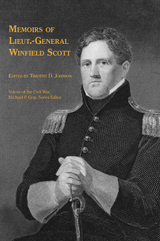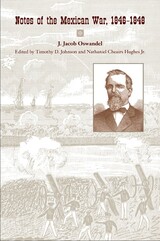
Scott joined the army in 1808, earned the rank of brigadier general in 1814, and was promoted to commanding general in 1841. During the Mexican-American War, he commanded one of the most brilliant military campaigns in American history and mentored the generation of officers who fought the Civil War, including Generals Grant, Lee, Longstreet, Beauregard, Jackson, and Meade. As a young general, he wrote the first comprehensive set of regulations to govern the army and pushed for the professionalization of the U.S. officer corps. Yet, he was ridiculed at the beginning of the war for his prescient prediction that the Civil War would be a prolonged conflict requiring extensive planning and superior strategic thinking.
With this edition, Johnson has merged Scott’s large two-volume memoir into a single, manageable volume without losing any of the original 1864 text. Extensive new annotations update Scott’s outdated notes and provide valuable illumination and context. Covering a wide range of events—from the famous 1804 duel between Aaron Burr and Alexander Hamilton through the end of the Civil War—Scott’s extraordinary account reveals the general as a sometimes
egocentric but always astute witness to the early American republic.
Timothy D. Johnson, professor of history at Lipscomb University in Nashville, is the author of Winfield Scott: The Quest for Military Glory and A Gallant Little Army: The Mexico City Campaign. He is coeditor, with Nathaniel Cheairs Hughes Jr., of A Fighter from Way Back: The Mexican War Diary of Lt. Daniel Harvey Hill and Notes of the Mexican War by J. Jacob Oswandel.

In December 1846, John Jacob Oswandel—or Jake as he was often called—enlisted in the Monroe Guards, which later became Company C of the First Pennsylvania Volunteer Regiment. Thus began a twenty-month journey that led Oswandel from rural Pennsylvania through the American South, onward to the siege of Veracruz, and finally deep into the heart of Mexico. Waging war with Mexico ultimately realized President James K. Polk’s long-term goal of westward expansion all the way to the Pacific Ocean. For General Winfield Scott, the victorious Mexico City campaign would prove his crowning achievement in a fifty-three-year military career, but for Oswandel the “grand adventure of our lives” was about patriotism and honor in a war that turned this twenty-something bowsman into a soldier.
Notes of the Mexican War, 1846–1848, is the quintessential primary source on the Mexican War. From Oswandel’s time of enlistment in Pennsylvania to his discharge in July of 1848, he kept a daily record of events, often with the perception and intuition worthy of a highly ranked officer. In addition to Oswandel’s engaging narrative, Timothy D. Johnson and Nathaniel Cheairs Hughes, Jr. provide an introduction that places Oswandel’s memoir within present-day scholarship. They illuminate the mindset of Oswandel and his comrades, who viewed the war with Mexico in terms of Manifest Destiny and they give insight into Oswandel’s historically common belief in Anglo-Saxon superiority—views that would bring about far worse consequences at the outbreak of the American Civil War a dozen years later.
As historians continue to highlight the controversial actions of the Polk administration and the expansionist impulse that led to the conflict, Notes of the Mexican War, 1846–1848, opens a window into the past when typical young men rallied to a cause they believed was just and ordained. Oswandel provides an eyewitness account of an important chapter in America’s history.
READERS
Browse our collection.
PUBLISHERS
See BiblioVault's publisher services.
STUDENT SERVICES
Files for college accessibility offices.
UChicago Accessibility Resources
home | accessibility | search | about | contact us
BiblioVault ® 2001 - 2024
The University of Chicago Press









